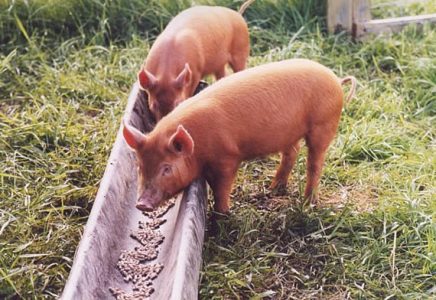Soybean meal is an excellent protein source and is widely used in pig feed. However, the Americas account for more than 80% of global soybean production, so European and Asia swine production largely depends on soybean imports.
The use of safe and functional unconventional feed sources can effectively alleviate worldwide protein shortage problems.
With that challenge in mind, researchers from China formulated a low-protein soybean-free diet (LPNS) for growing and fattening pigs using rice, potatoes, tea, and other unconventional feed sources.
Fatty-type pigs and research method
For their research, the researchers used Daweizi pigs. This fatty-type pig breed in China is characterized by tender meat and tolerance to rough feeding. However, compared with lean-type pigs, such as Duroc × Landrace × Large White pigs, Daweizi pigs have a lower growth rate and feed efficiency, a higher fat percentage, and a lower lean mass rate.
Thirty-six healthy Daweizi pigs (average body weight 23.60 ± 1.34 kg) were raised under the same conditions and randomly assigned to two dietary treatments: (1) Con group, corn-soybean base meal and (2) LPNS group.
When the average weight of pigs in the group reached 85kg, two pigs per pen were randomly selected and euthanized for collection of the colonic digesta and carcass traits and for meat quality determination.
Significant improvement on carcass traits and meat quality
Compared with the corn-soybean based diet, the LPNS diet decreased the average daily gain (ADG) and feed conversion ratio (FCR) of Daweizi pigs but had a lower cost per kilogram of gain.
In addition, the LPNS diet significantly increased leanness and decreased the fat-skin rate and bone rate of Daweizi pigs. The cooking loss of meat decreased, and unsaturated fatty acids such as C22:6 and n−3 PUFA significantly increased in the LPNS group. Moreover, the purine content in the meat substantially decreased with the LPNS diet.
The 16S rDNA analysis revealed that the LPNS diet greatly modified the composition of the colonic microbiota community, with a decrease in the Firmicutes/Bacteroidetes ratio and an increase in the abundance of Lactobacillus spp.
Conclusion
The researchers concluded that compared with the corn-soybean meal-type diet, the LPNS diet significantly improved the carcass traits and meat quality of Daweizi pigs, although it affected the feed-to-weight ratio.
Therefore, they suggest the use of other alternative feed sources that could be grown locally for fatty-type local pig breeds, which are cost-effective and suitable for small-scale pig farming.

